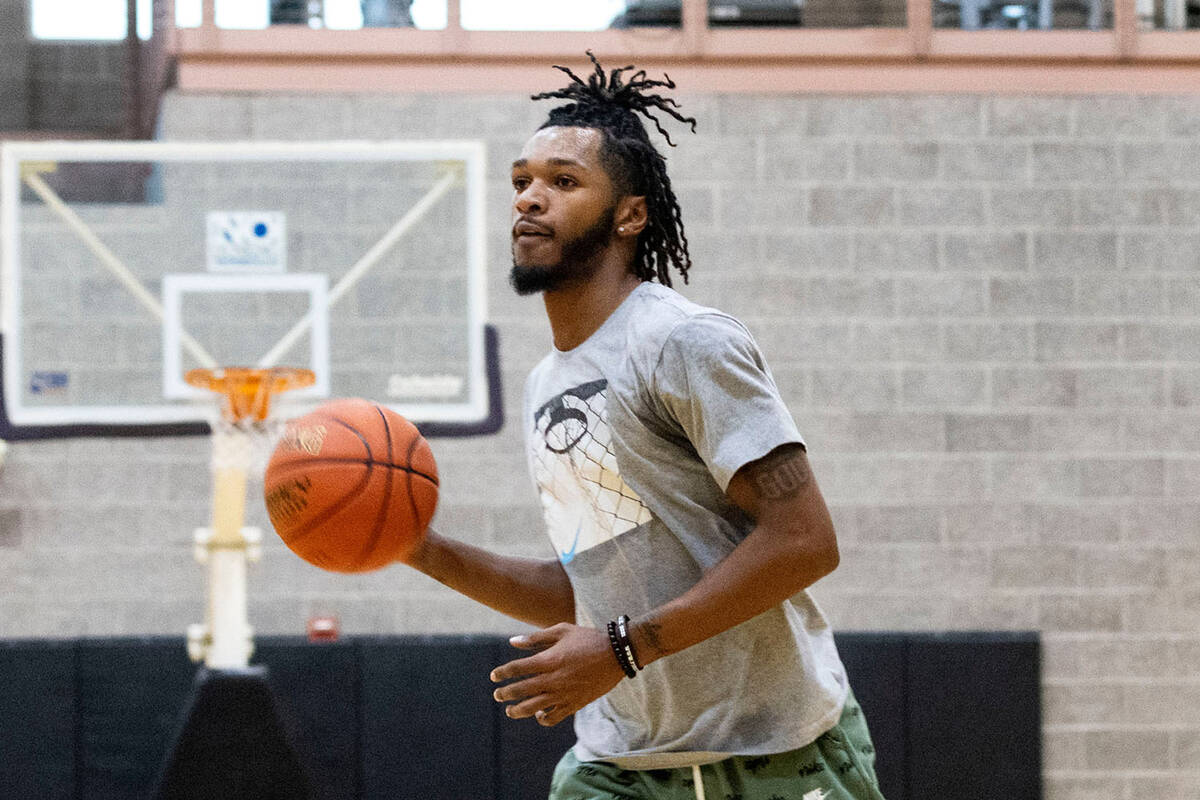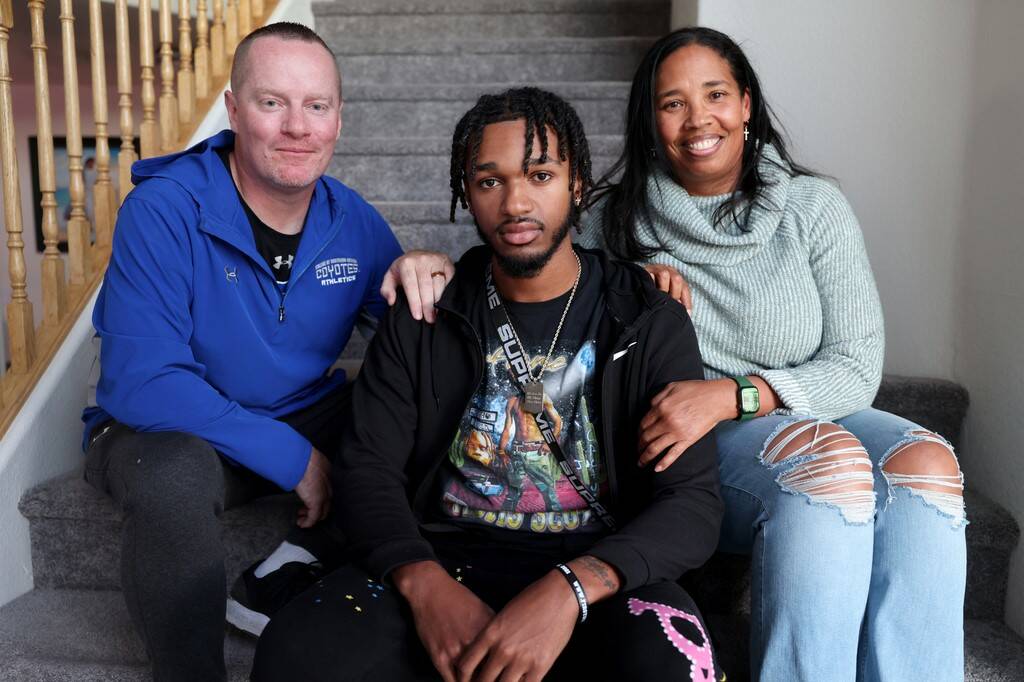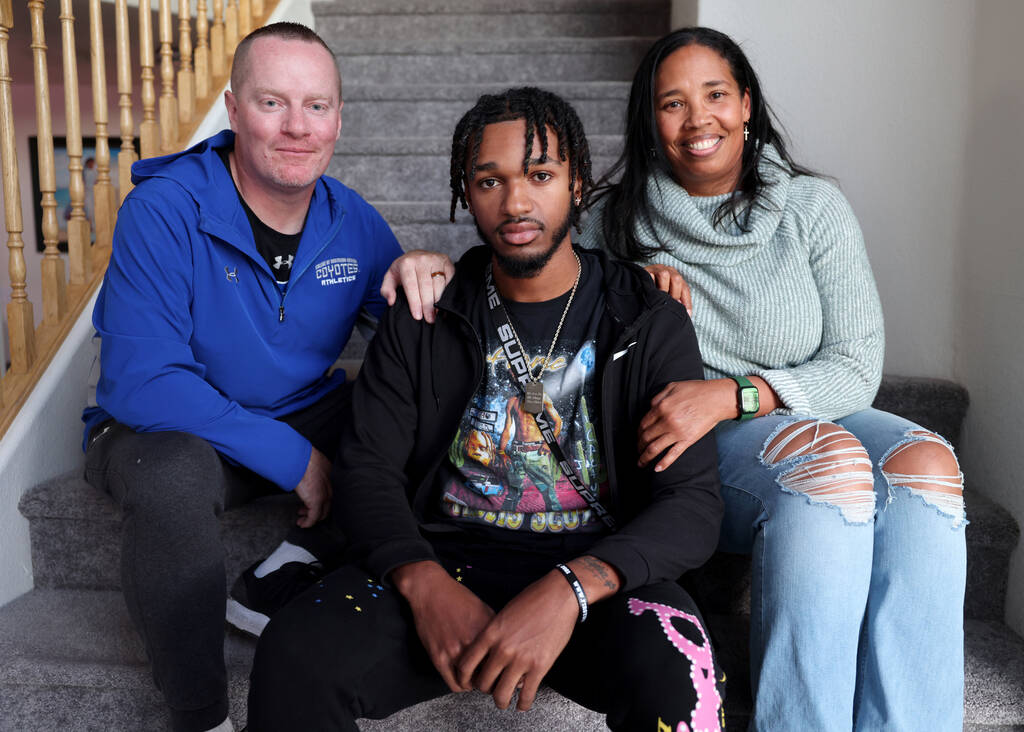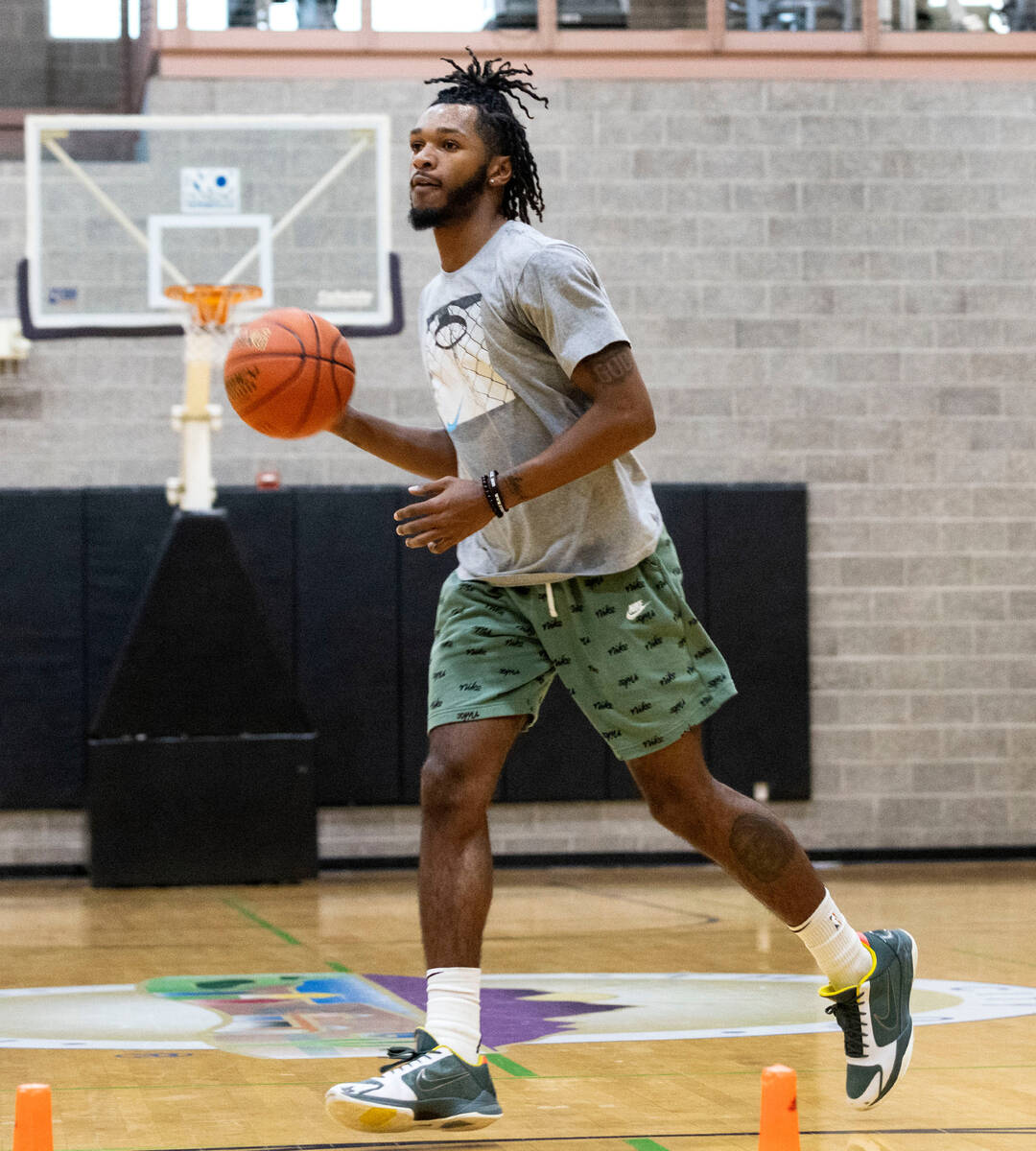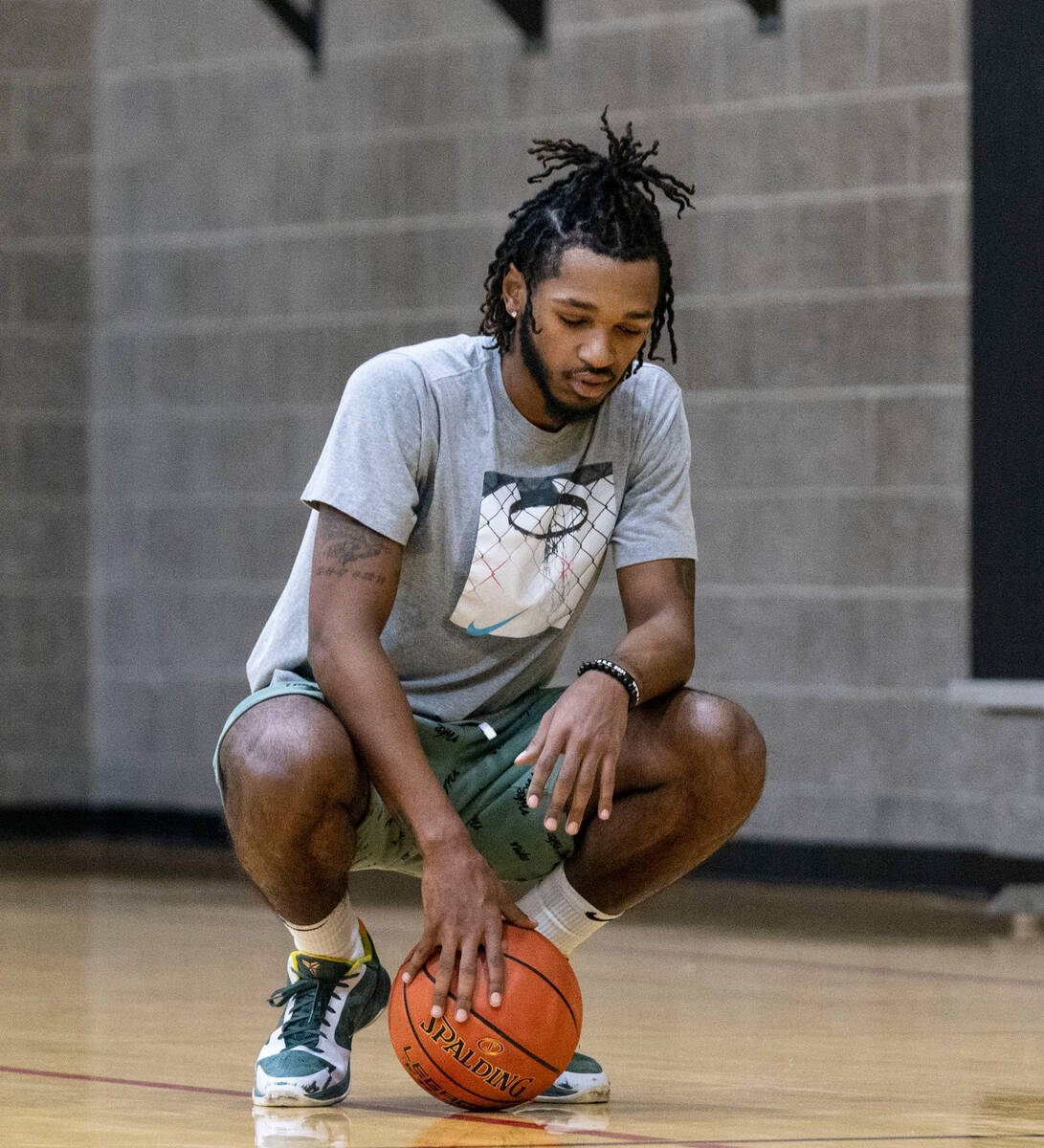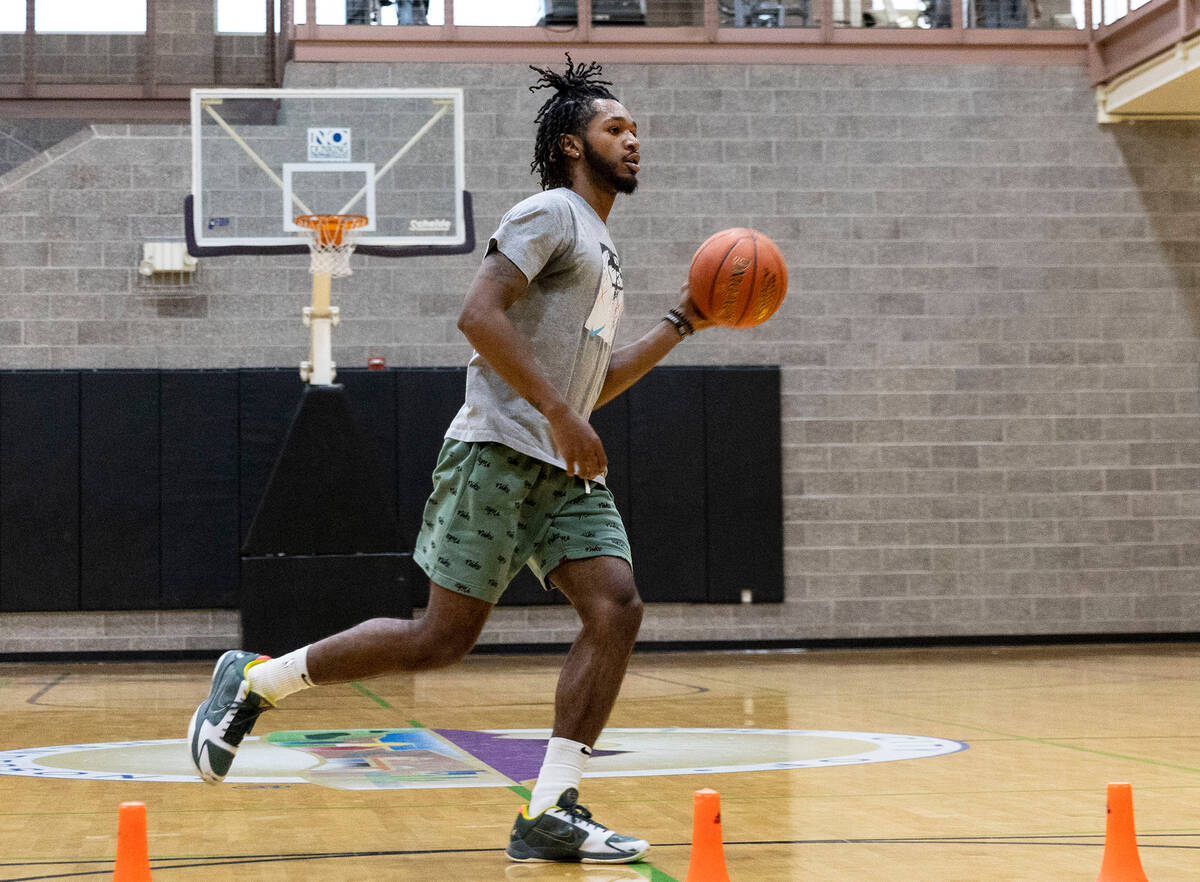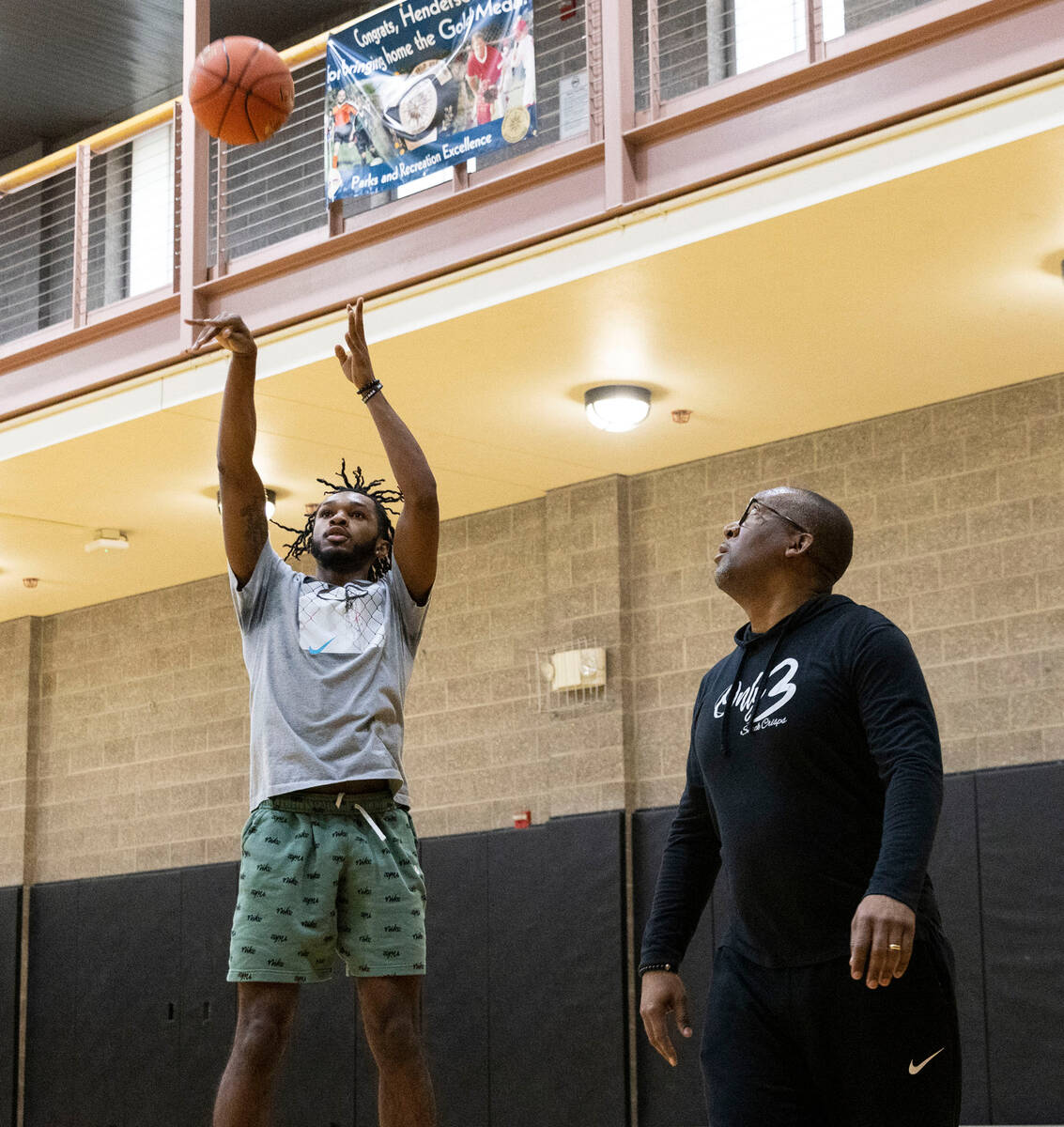Regaining his shot: Former Coronado star aims to play for CSN after stroke
The basketball he’d so effortlessly slam through the hoops across the Las Vegas Valley now occasionally slips from the grasp of his right hand. But Felix Reeves doesn’t frustrate as easily anymore.
So he corrals it and saunters to the top of the key inside the Henderson Community Center gymnasium, steadying himself as he begins to dribble.
His shot, handle and stamina have weakened, necessitating the daily 6 a.m. workouts filled with 45 minutes of the most fundamental fundamentals. But his resolve, faith and spirit are stronger than ever.
“I’m alive. I don’t know what to say, honestly,” Reeves said. “I want to live my life how I want to live it. … To the fullest.”
For the Coronado graduate, that means returning in full to the basketball team at the College of Southern Nevada, where he was poised to play this season before suffering a stroke on the evening of Sept. 24. A blood clot formed that night in his brain, robbing the 6-foot-5-inch wing of basic cognitive and motor skills during an 18-day stay at Dignity Health-St. Rose Dominican Hospital.
He was released Oct. 11, the day after his 21st birthday.
In the last three months, Reeves has had to relearn how to walk, talk, dribble and shoot — and has reaffirmed that he plans to play next season for the Coyotes.
“I have full faith in confidence that he’ll be in his uniform next fall,” CSN basketball coach Russ Beck said. “That he’ll put in the work, that we’ll put in the work and that God will continue to bless him and put him in that position.”
More than a headache
Reeves and his girlfriend were socializing in her backyard the evening of Sept. 24 when he began to feel pain behind his eyes. He went inside her house, hoping a nap would ease the headache. Within a half-hour, the right side of his body began to distort.
He awoke at her urging and noticed his leg was “looking a little weird” but resumed sleeping rather unconcerned. He awoke again 10 minutes later without any sensation on his right side. He tried to speak.
“I kept getting mad. Nothing would come out. It was mumbled,” Reeves said — triggering an emergency phone call from his girlfriend.
Within minutes, Reeves was transported by ambulance to the hospital’s intensive care unit, where his mother, Rannai Love, and Beck would pray for him as soon as they arrived. He slept for hours and hours on end, awaking to the sound of former high school teammate Jaden Hardy’s voice via phone without an understanding of why he was hospitalized.
Reeves spoke again on Sept. 28 and stood for the first time Sept. 29.
“I didn’t know what happened, but my Mom told me the story,” Reeves said. “Thank God I’m alive.”
Dr. Paul Janda, the director of stroke and neurology at Valley Hospital Center and Centennial Hills Medical Center, said strokes in young patients, “especially those that are athletes,” are rare.
Janda estimated that roughly 10 percent of stroke patients are between 18 and 40. That Reeves is already running, dribbling and shooting is already “very impressive,” said Janda, who did not treat Reeves.
“If he’s ever able to play basketball again competitively after having a stroke, not only is that amazing for him,” Janda added, “but for the whole stroke community.”
Before the stroke
Reeves has since reclaimed the personality that made him one of the most popular players in the Las Vegas Valley. The one cultivated by his mother and his seven sisters, who collectively crafted the caring temperament he brought to Las Vegas in 2014 when his family moved from its native Atlanta.
He’s long loved basketball, admiring NBA greats Kevin Durant and Russell Westbrook during their Oklahoma City heyday.
The sport has helped him foster lifelong friendships, first at Lois and Jerry Tarkanian Middle School. Then at Desert Oasis. Then at Coronado, from which he graduated in 2020 following two successful basketball seasons.
As a bouncy and versatile shooting guard and small forward, Reeves received Division I interest as a complement to former Cougars star Hardy, now a rookie with the NBA’s Dallas Mavericks. But only Texas-San Antonio would offer Reeves a scholarship.
He visited the school’s campus toward the end of his senior season and was unsure about the potential fit.
“I just didn’t feel the vibe,” he said. “You know how you feel like, ‘This is home?’ I didn’t feel the home type of vibes.”
Devoid of viable alternatives, Reeves still planned to sign a national letter of intent during the spring signing period. But when Reeves telephoned the UTSA coaches to solidify his verbal commitment, they didn’t answer his call.
Heartbroken and resigned to the end of his basketball career amid the onset of the COVID-19 pandemic, Reeves stopped playing altogether for a few months — utilizing video games to cope as his enthusiasm waned.
“It was traumatic,” Love said, referencing the sudden stop to her son’s career. “We were scrambling for ‘How do we keep this going?’”
Hardy invited Reeves to attend his daily workouts that summer, reinvigorating his passion and interest in playing beyond graduation. “He came out of his little shell again and just started to get at it again,” Love added.
Coming home
One-year stints at NELA Prep Academy in Los Angeles and Cypress College in Orange County preceded Reeves’ transfer to CSN, which rebooted its program in 2020-21 after a 17-year hiatus. Beck had previously watched Reeves play for Coronado and believed he had untapped potential.
They remained in contact during Reeves’ tour of California, usually via text message or social media.
Reeves elected to return to Las Vegas after his freshman year of 2021-22 at Cypress College, committing to CSN after a season in which he started 21 of 30 games and averaged 6.7 points on 53.6 percent shooting in 21.7 minutes per game.
“My homecoming,” he said through his signature grin. “It felt good knowing I had a place to come home to.”
Upon his March return, Reeves opted to focus on strength and conditioning before incorporating skill development into his regimen. He would lift weights and run, resuming basketball activity in July with nary an issue regarding his health.
The comeback trail
A miniature basketball hoop hung from the door in Reeves’ room in the intensive care unit, allowing him to shoot with a miniature ball at his convenience. He could barely grip the ball when he began. But the power of perseverance — and rehabilitation under the supervision of physical therapists and medical experts — helped him loft shots toward the rim before his release.
Nurses would stand in the window and applaud his progress. Friends and teammates called regularly until he was discharged. He rejoined them at practice in the middle of October, entering the gym to a chorus of cheers and with the confidence that he’ll one day compete again.
Said Reeves with a smile: “I knew I was going to push through.”
When Reeves began to train again later that month, he couldn’t dribble or shoot with his weakened right arm. But it has strengthened since his workouts began under the guidance of player development specialist Damion Byrd.
The motor skills on the left side of his body remain intact as those in his right redevelop. Basic ball handling and shooting drills challenge Reeves, whose effort never wavers as his stamina builds.
“He’s still in there. … That person is still there,” Byrd said. “The game is not going to leave him behind. There’s still going to be a place for him when the time is right.”
For now, that place is in a gymnasium opposite Byrd. Or next to Beck on the sideline during practices or games.
Next season, it’s in a CSN uniform.
“Basketball is the love of my life,” Reeves said. “At this point in time right now, I’m not looking back on anything.”
Contact Sam Gordon at sgordon@reviewjournal.com. Follow @BySamGordon on Twitter.



